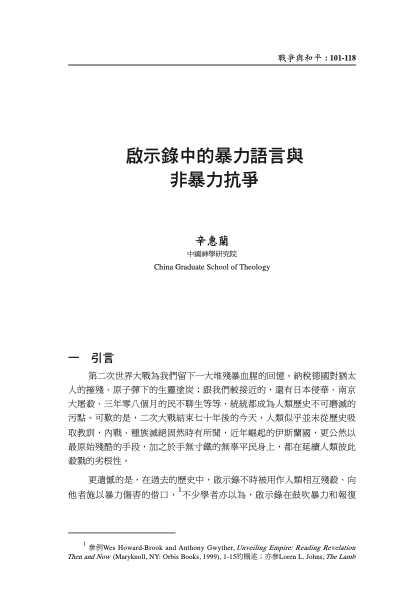啟示錄中的暴力語言與非暴力抗爭/辛惠蘭
辛惠蘭
撮要
本文從啟示錄的體裁和整體寫作目的出發,探討作者運用看似暴力的語言和圖象的修辭目的,繼而從作者和讀者的共同神學觀點,分析這些語言對讀者所產生的效果和影響。
文章指出,啟示錄的目的是要透過顛覆性的喻象和語言,刺激讀者以另類眼光來理解周圍的政治現實,放棄眼前的政治經濟好處,持守忠心見證,堅持最後效忠上主。書卷提及的審判和對仇敵遭報的盼望,只在表達邪惡最終得以清除、公義得着伸張、上主主權得着彰顯的願景。在邪惡自招苦果的同時,亦看見上主的憐憫和慈愛,和祂最後要讓世界達至真正和平的美意。
當人普遍靠賴武力脅迫來達成自己的目標,書卷卻將基督徒構思成以耶穌十架上的示範為藍本,藉賴順服和自我犧牲而得勝的另類羣體。
ABSTRACT
This essay starts from the genre and the overall purpose of the Book of Revelation to investigate the rhetorical purpose of its apparently violent languages and images. The effects and influence of these languages on the readers will then be analyzed from the common theological perspectives shared by the author and his readers.
The essay argues that by employing these subversive imagery and language, the purpose of the Book of Revelation is to provoke the readers to understand the surrounding political reality through alternative lens. It is hoped that the readers will give up what seems to be politically and economically advantageous at the moment so as to maintain their faithful witnesses and to uphold their ultimate allegiance to God. The hope for final judgment and revenge on enemies, as evinced in the Book, is no more than an expression of the vision for the final removal of evil, fulfillment of justice and revelation of God’s sovereignty. While evil meets its end, God’s mercy and love, as well as His goodwill and purpose for the world to achieve true peace can also be seen.
While human beings generally rely on violence and might to achieve their own goals, the Book of Revelation perceives Christians as an alternative community conquering through obedience and self-sacrifice basing on the example of Jesus on the Cross.
原載於《建道學刊》46期(2016年7月),頁 101-118。
Latest Articles
新手牧者研究計劃(三):新手牧者的身心靈狀態 / 盧慧儀
2025 年 11 月 19 日
個體與關係:滕近輝思想中「深化」的靈性觀 / 倪步曉
2025 年 11 月 18 日
香港九龍塘基督教中華宣道會之起源和發展史/陳智衡
2025 年 10 月 20 日
Highlights
[電子書]困境與抉擇:「建道研究中心30週年誌慶」跨學科研討會論文集/廖炳堂、倪步曉主編
2025 年 1 月 2 日
從梧州到長洲:建道神學院125年的挑戰與恩典 / 陳智衡
2023 年 10 月 1 日
微小教會的見證/高銘謙
2023 年 6 月 1 日







